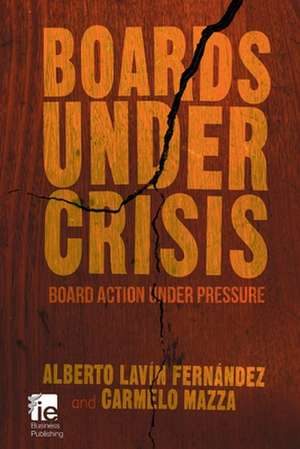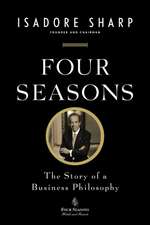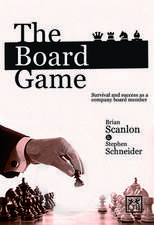Boards Under Crisis: Board action under pressure: IE Business Publishing
Autor Carmelo Mazza, Alberto Lavin Fernandezen Limba Engleză Paperback – 2014
| Toate formatele și edițiile | Preț | Express |
|---|---|---|
| Paperback (1) | 312.76 lei 6-8 săpt. | |
| Palgrave Macmillan UK – 2014 | 312.76 lei 6-8 săpt. | |
| Hardback (2) | 302.86 lei 6-8 săpt. | |
| Palgrave Macmillan UK – 26 mai 2014 | 381.27 lei 3-5 săpt. | |
| Springer Nature Switzerland – 24 oct 2024 | 302.86 lei 6-8 săpt. |
Preț: 312.76 lei
Nou
Puncte Express: 469
Preț estimativ în valută:
59.88€ • 62.36$ • 49.69£
59.88€ • 62.36$ • 49.69£
Carte tipărită la comandă
Livrare economică 14-28 februarie
Preluare comenzi: 021 569.72.76
Specificații
ISBN-13: 9781349478644
ISBN-10: 1349478644
Pagini: 212
Ilustrații: XVII, 212 p.
Dimensiuni: 155 x 235 mm
Greutate: 0.33 kg
Ediția:1st ed. 2014
Editura: Palgrave Macmillan UK
Colecția Palgrave Macmillan
Seria IE Business Publishing
Locul publicării:London, United Kingdom
ISBN-10: 1349478644
Pagini: 212
Ilustrații: XVII, 212 p.
Dimensiuni: 155 x 235 mm
Greutate: 0.33 kg
Ediția:1st ed. 2014
Editura: Palgrave Macmillan UK
Colecția Palgrave Macmillan
Seria IE Business Publishing
Locul publicării:London, United Kingdom
Cuprins
1. Boards In Their Environment 2. Crisis, What Crisis? Boardroom Crisis in Corporate Settings 4. What You Can Do Tomorrow Will Depend Largely on Your Thinking Today: Increased Short Termism and Strategic Myopia During Crisis 5. 'I want to personally check that': Centralization at the Boardroom During Crisis 6.The Portrait of Board Life from Within. Parochialism and Conflict at the Top 7. Strategic Management and OB 8. Remedies for Defective Decision Making Models Under Crisis
Notă biografică
Alberto Lavín has been an international management consultant for the last 20 years. As a senior executive with Accenture, the technology and consulting firm, he has worked extensively with corporations and public organizations in Europe, Latin America and the US in topics of strategic change, organizational transformation and leadership development. Prior to Accenture, he worked for El Corte Inglés group, one of the leading retailers worldwide. Doctor Lavín combines consulting with management education and research on a variety of corporate topics, among them boardroom decision making. He currently leads his own consulting practice advising technology firms on a number of strategy and change issues. He is also an Adjunct Professor with IE Business School. Alberto Lavín holds management degrees from Universidad Comercial de Deusto, IESE Business School and a Doctorate in Business Administration from IE Business School. He is a member of the Academy of Management.
Carmelo Mazza is currently Adjunct Professor of Organization Theory at LUISS Business school, Roma. He holds a PhD in Business Economics from IESE Business School, Barcelona (Spain). His research interests have focused on dynamics of institutional change and transformation, in particular in the media industry and in creative industries such as film, festivals and haute cuisine. Other streams of research are management consulting from a constructivist perspective and the process of university reform.Carmelo Mazza has been teaching Organizational Behavior and Contemporary Organization Theory in several institutions such as IESE Business School, Copenhagen Business School, Grenoble Ecole de Management, University of Roma "La Sapienza" and IE Business School. In the same period, he took part in several consulting projects on the restructuring of large private organizations, public sector and on regulation drafting. He has been also founding partner of two consulting boutiques. Carmelo Mazza regularly publishes on international refereed journals such as Organization Studies, Human Relation, Organization and Management Learning and is member of (EGOS) and the Academy of Management.
Carmelo Mazza is currently Adjunct Professor of Organization Theory at LUISS Business school, Roma. He holds a PhD in Business Economics from IESE Business School, Barcelona (Spain). His research interests have focused on dynamics of institutional change and transformation, in particular in the media industry and in creative industries such as film, festivals and haute cuisine. Other streams of research are management consulting from a constructivist perspective and the process of university reform.Carmelo Mazza has been teaching Organizational Behavior and Contemporary Organization Theory in several institutions such as IESE Business School, Copenhagen Business School, Grenoble Ecole de Management, University of Roma "La Sapienza" and IE Business School. In the same period, he took part in several consulting projects on the restructuring of large private organizations, public sector and on regulation drafting. He has been also founding partner of two consulting boutiques. Carmelo Mazza regularly publishes on international refereed journals such as Organization Studies, Human Relation, Organization and Management Learning and is member of (EGOS) and the Academy of Management.
Textul de pe ultima copertă
Crises, in the past, have been cyclical events in economic history. However, we are currently experiencing an acceleration of these cycles with shorter time span in-between major events. In a period of 20 years, from 2001 to 2021, we have lived three global major crisis events: The Twin Tower Attack on September 11th, 2001, the Financial Crash in 2008, and the Covid-19 pandemic from 2020.
In the first edition of this book, the authors explained the main decision-making patterns of behavior (i.e. short termism, centralization, and parochialism) that characterized the management processes of Boards of Directors during the financial crash. Now, in this revised and updated second edition, the authors explore the main commonalities and differences between decision making at the top during the previous financial crisis and during the most recent Covid 19 global pandemic, as well as during the inception of the war in Ukraine. In doing so they ask, is this a new crisis or just the “new normal” that businesses and organizations need to face after major catastrophic events?
By first reassessing the very meaning of the word ‘crisis,’ the authors explore the relationship between frequent crises, emergency cabinets and socially widespread fear as determinants of a “new normal” rather than as the extraordinary state of our societies. In this sense, the authors identify more nuanced and updated consequences of short termism, centralization and parochialism that could shape the changes after the current crisis and the approach to next crisis to come
Alberto Lavín Fernández is Strategy Adjunct Professor for IE Business School. Previously, he was a partner with Accenture, the technology and management consulting giant. He now heads his own consulting practice specialized in strategy and transformation and acts as a long term advisor and nonexecutive director in some businesses in the lodging industry. He published "Boards under crisis: board action under pressure" in 2014, together with Carmelo Mazza.
Carmelo Mazza holds a PhD in Business Economics from IESE Business School, Barcelona (Spain). His research interests have focused on dynamics of transformation of creative companies and Boards of Directors. Carmelo Mazza taught Organizational Theory related topics in several leading institutions such as IESE Business School, Copenhagen Business School, Grenoble Ecole de Management, University of Rome "La Sapienza", and IE Business School.
In the first edition of this book, the authors explained the main decision-making patterns of behavior (i.e. short termism, centralization, and parochialism) that characterized the management processes of Boards of Directors during the financial crash. Now, in this revised and updated second edition, the authors explore the main commonalities and differences between decision making at the top during the previous financial crisis and during the most recent Covid 19 global pandemic, as well as during the inception of the war in Ukraine. In doing so they ask, is this a new crisis or just the “new normal” that businesses and organizations need to face after major catastrophic events?
By first reassessing the very meaning of the word ‘crisis,’ the authors explore the relationship between frequent crises, emergency cabinets and socially widespread fear as determinants of a “new normal” rather than as the extraordinary state of our societies. In this sense, the authors identify more nuanced and updated consequences of short termism, centralization and parochialism that could shape the changes after the current crisis and the approach to next crisis to come
Alberto Lavín Fernández is Strategy Adjunct Professor for IE Business School. Previously, he was a partner with Accenture, the technology and management consulting giant. He now heads his own consulting practice specialized in strategy and transformation and acts as a long term advisor and nonexecutive director in some businesses in the lodging industry. He published "Boards under crisis: board action under pressure" in 2014, together with Carmelo Mazza.
Carmelo Mazza holds a PhD in Business Economics from IESE Business School, Barcelona (Spain). His research interests have focused on dynamics of transformation of creative companies and Boards of Directors. Carmelo Mazza taught Organizational Theory related topics in several leading institutions such as IESE Business School, Copenhagen Business School, Grenoble Ecole de Management, University of Rome "La Sapienza", and IE Business School.
Caracteristici
Reveals the nature of internal tension at the Boardroom driven by parochial interests Highlights the nature of senior management decision making as a mix of reason and emotion Offers theory and fact-based suggestions on how to improve senior management effectiveness


















